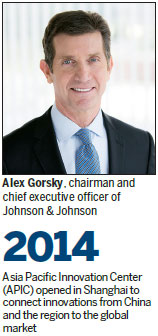The secrets to sustainable innovation in healthcare
The Chinese government has been actively encouraging innovation and mass entrepreneurship for several years. Now, mass entrepreneurship and innovation takes place not only in small and micro firms, but also in large companies. The global CEO of Johnson & Johnson, Alex Gorsky, shares his insights on innovation.
Q: As the CEO of a company that has put so much emphasis on innovation, I wonder how you encourage innovation and how you commercialize the great ideas it produces?
A: Well, I was really encouraged to hear the comments by the Premier Li Keqiang, who emphasized the importance of innovation in both small firms and large companies, because I completely agree that innovation requires a very healthy innovation ecosystem to happen - and having things such as, first of all, great education systems. We've got trained scientists, researchers, innovators. We have the kinds of capabilities, the insights, to actually provide that foundation: having a strong intellectual property foundation; making sure that we have a system that encourages publications, studies, research, to actually be conducted. And then, making sure that we have an environment where academic centers, venture centers, companies large and small, can work in tandem. That's really what it takes to create, we find, innovation. And what I have seen, what we've seen developed here in China, is a system that's much more conducive to that kind of entrepreneurship, innovation, creativity, ingenuity going forward than many other places you see around the world.

Q: Johnson & Johnson established an Asia Pacific Innovation Center in Shanghai. Can you tell us how it works?
A: Sure. Well, as you can imagine, a company the size of Johnson & Johnson - where we're now approximately $75 billion in sales in countries around the world, participating in the pharmaceutical industry, the medical device industry, the consumer industry - one of the very best parts of my job is being able to interact with researchers on one day, where I could be talking about multiple myeloma, the next hour I could be talking about minimally invasive surgery, and the next hour I could be talking about a new approach in wellness and prevention, so it's a very diverse, interesting and engaging array of sciences and technology and innovation at any one time. But to cultivate that requires us not only to depend on our own internal innovation, or organic innovation, but also to look externally. How do we connect with, again, up-and-coming new ideas from around the world on a global scale? It requires us constantly to be partnering, and I would say, as much as we focus on research and development, we focus as much on what I'd call "search and development" by making sure that we're identifying, partnering, creating relationships with the very best new ideas, being completely agnostic about the actual source, but ultimately focusing on the best solution. And about 50 percent of the innovation we have at Johnson & Johnson, we source externally versus inside, and so putting an innovation center here in Shanghai, as we have in other great cities around the world - London, San Francisco, San Diego, Boston, satellite centers in Texas and Israel and Europe - we have one here in Shanghai now, and again it's part of that earlier innovation ecosystem we were talking about, to create those connections, to make sure that we are working with scientists here in the local area, having them provide unique insights into unmet medical needs, and working in a very collaborative way to say how can we apply our clinical development, our regulatory skills, our commercial skills, our reimbursement ideas, all to ultimately take an idea and actually create a product that can help someone's life.
Q: What will Johnson& Johnson do to cooperate with China's plan for a healthier nation?
A: We've worked across a number of stakeholder groups. In some cases, we'll work with the government, for example, on important programs to help treat conditions like tuberculosis. Very, very difficult, and we're really proud of the fact that just a couple of years ago we launched a program with a drug called Bedaquiline, which was the first of its kind in nearly 40 years to come out, for multidrug-treatment-resistant tuberculosis, so it really showed a public-private partnership working together in tandem, against a very difficult disease. Something else that we do, we spend a lot of time educating physicians on new techniques in minimally invasive surgery. You know, surgery has come so far, I'm an example myself. Unfortunately, after many miles of running and triathlons and too many activities, I destroyed my left hip and had to have it replaced last year. And 10 years ago, my recovery may have meant several weeks in hospital. It would have meant I would be walking with a cane, my mobility would have been encumbered for likely several months. Because of new techniques, great products, the right kind of care, I was able to walk with a cane within hours after my surgery, I was discharged after 24 hours from the hospital, within three days I could walk for a mile with the cane, and today I have, really, complete mobility, and ability restored just six months post-surgery. And so, training physicians, educating them on those kinds of techniques that have a huge impact on patients and populations over time is very important.
Q: By having this partnership with the government, and by training those people, what does it bring to Johnson& Johnson?
A: It's in all of our best interests. Our number one commitment as per Our Credo, which is the ethos that guides our company, is to help patients, to help consumers, and that always motivates us. We know that ultimately if we're connecting with patients, if we're getting them the right products, that will over the long term create a great business opportunity, so it becomes self-propagating. And, look, we've worked with great maternal care programs, with mothers here in China, to help ensure that newborn infants are able to breathe early in their lives, as soon as they're born. We're looking for many other diseases, so we think we've got an important role to play in education, prevention, and also ultimately in treatment, and when we show up in all those areas, it results in a great opportunity for us as well.
|
Johnson & Johnson is among the first multinationals in China to achieve the "end-to-end" R&D model, which nurtures the development of early discoveries into clinical applications.Photos Provided To China Daily |
(China Daily 04/26/2017 page12)









